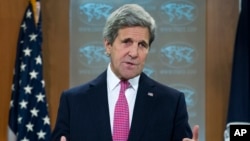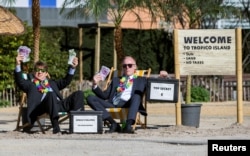U.S. Secretary of State John Kerry may be gently scolded Thursday when he attends an anti-corruption summit hosted by Prime Minister David Cameron in London.
“Corruption is an enemy of progress and the root of so many of the world’s problems,” Cameron said before the summit that will call into question the practices of rich nations like Britain and the United States.
The summit’s aim will be to agree on mechanisms to expose and punish corruption. The meeting will include leaders of Afghanistan, Colombia, and Nigeria.
But the focus will be not only on corruption in the developing world, but on the transparency of rich nations. This is due in part to revelations in the so-called Panama Papers about how and where the world’s rich and powerful hide their money.
“We have moved away from this idea that it’s the African kleptocrats who are involved in corruption. It’s clear today that financial secrecy is provided by rich countries like the U.S. and the U.K.,” Alex Cobham, director at research at the Tax Justice Network, a London advocacy group, told VOA.
Cameron’s summit is taking place after the Panama Papers leaks revealed his late, wealthy father ran an offshore fund to avoid paying British taxes. Later revelations showed the prime minister had a stake in the dealings, something the British leader has admitted.
Pressure for reforms
Cameron’s government has been under pressure to carry out reforms that include a public register of British companies with overseas holdings. There is also pressure for Britain to extend reforms to its offshore possessions after the Panama Papers revealed more than half of the 210,000 companies exposed were registered in the British Virgin Islands.
The Panama Papers leaks named relatively few Americans and no high-ranking public officials. But anti-corruption advocates see the United States as a major area of concern when it comes to allowing tax evasion and money laundering in states like Delaware, Nevada, and Wyoming, which critics say permit businesses to be formed inexpensively and secretively.
Secretary Kerry may speak in support of reforms in the United States, but expectations are tempered by the fact the U.S. government’s power is limited since the states have the right to set many of their own banking regulations.
Bolstering Kerry’s position at the summit are steps the Obama administration unveiled this month to combat money laundering, corruption and tax evasion. The actions by the U.S. Treasury Department include requiring financial institutions to find out and verify who actually owns and profits from companies that make use of their services. That information will then be available to law enforcement agencies.
But anti-corruption campaigners said the top U.S. diplomat will get a message, quietly, but repeatedly at the anti-corruption summit. “He will hear the world identifies the U.S. as the biggest non-cooperative jurisdiction,” said Cobham.
Analysts say Washington and London are taking the need for anti-corruption reforms seriously. Both see it as a matter of legitimacy and security, especially following the financial crisis of the past decade that has resulted in poverty, unemployment, and frustration among millions.
Rebuilding trust, transparency
Tim Evans, a professor of political economy at London’s Middlesex University, sees the summit, and more broadly, the drive to combat corruption as a sign of concern among the elite nations.
“They’re worried at the loss of legitimacy that will come from rich and powerful people being able to evade taxes and get away with it. So, I think there’s huge pressure on elites to be seen to be engaging the subject and to be doing something about it.”
“Given some of the things, some of the riots and problems we’ve seen in Europe and in the United States in recent years, the politicians are fearful and they’re becoming focused on trying to rebuild trust and transparency,” he told VOA.






